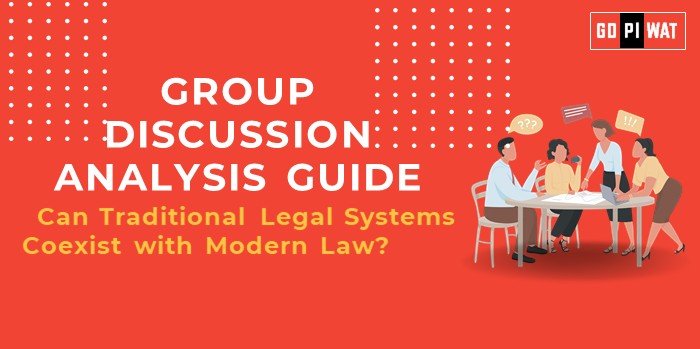📋 Group Discussion Analysis Guide
💡 Topic: Can Traditional Legal Systems Coexist with Modern Law?
🌐 Introduction to the Topic
- Opening Context: The question of coexistence between traditional legal systems and modern law embodies the tension between heritage and progress. Across the globe, societies grapple with integrating deep-seated customs with the demands of contemporary justice systems.
- Topic Background: Traditional legal systems often reflect localized, culturally ingrained methods of resolving disputes, while modern law is characterized by codification, uniformity, and global compatibility. This duality poses challenges in ensuring equity while respecting cultural diversity. The ongoing debates on customary practices versus constitutional mandates highlight the complexity of coexistence.
📊 Quick Facts and Key Statistics
• 🌍 Global Legal Pluralism: Over 25% of countries recognize some form of customary or religious law within their legal framework (UNDP 2023).
• 🇮🇳 India Example: Over 90% of rural disputes are resolved via traditional panchayats (non-codified governance).
• 🌍 African Context: Traditional law is constitutionally recognized in countries like South Africa and Kenya.
• 📊 Global Surveys: 60% of surveyed individuals in dual systems feel modern laws often undermine cultural norms (Pew Research 2022).
• 🇮🇳 India Example: Over 90% of rural disputes are resolved via traditional panchayats (non-codified governance).
• 🌍 African Context: Traditional law is constitutionally recognized in countries like South Africa and Kenya.
• 📊 Global Surveys: 60% of surveyed individuals in dual systems feel modern laws often undermine cultural norms (Pew Research 2022).
🤝 Stakeholders and Their Roles
- 🏛️ Government: Balances constitutional rights with regional autonomy.
- ⚖️ Judiciary: Integrates or limits customary law to align with fundamental rights.
- 🌐 Cultural Communities: Preserve traditional practices within legal pluralism.
- 📣 International Organizations: Advocate for human rights adherence within legal pluralism frameworks.
🏆 Achievements and ⚠️ Challenges
Achievements:
- 🤝 Community Engagement: Traditional systems enhance community participation in justice delivery.
- ⏳ Efficient Resolution: Quicker dispute settlement compared to formal courts in many cases.
- 🌍 Cultural Preservation: Recognizing traditional law ensures cultural diversity is respected.
Challenges:
- ⚖️ Human Rights Issues: Practices like trial by ordeal violate universal human rights.
- 📜 Legal Ambiguity: Coexistence leads to conflicts in jurisdiction and authority.
- 🌐 Modernization Pressure: Rapid globalization threatens traditional frameworks.
🌍 Global Comparisons:
- 🇧🇼 Success: Botswana integrates customary law with modern principles for land disputes.
- 🇳🇬 Challenges: Nigeria’s dual system faces tension between Sharia and common law.
Case Study: India’s Panchayat System: Resolves land disputes but struggles with issues like caste bias.
📖 Structured Arguments for Discussion
- 📈 Supporting Stance: “Traditional systems are vital for culturally sensitive justice delivery.”
- 📉 Opposing Stance: “Traditional systems often contradict constitutional principles, risking injustice.”
- ⚖️ Balanced Perspective: “While traditional systems are culturally rooted, they require reforms to align with modern law.”
🎯 Effective Discussion Approaches
Opening Approaches:
- 📜 “Historically, traditional systems have served as the bedrock of community justice in many countries.”
- 📊 “Modern law offers inclusivity and equity, but often at the expense of cultural specificity.”
Counter-Argument Handling:
- 💡 Example: When challenged on cultural biases in traditional systems, cite Botswana’s integrated reforms to address similar issues.
🛠️ Strategic Analysis of Strengths and Weaknesses
SWOT Analysis:
- Strengths: Community-centered justice, low-cost dispute resolution.
- Weaknesses: Lack of codification, risks of entrenched biases.
- Opportunities: Hybrid legal systems combining the best of both worlds.
- Threats: Conflicts between local and national authority.
🌍 Connecting with B-School Applications
- 📈 Real-World Applications: Discuss applications in social entrepreneurship, policy reforms, and CSR initiatives.
- 📚 Sample Interview Questions:
- 💡 “How can dual legal systems promote sustainable development?”
- 🔍 “Analyze the implications of cultural relativism on global business laws.”
- 📖 Insights for Students:
- 🌱 Opportunities in legal innovation, stakeholder negotiations, and conflict resolution.


